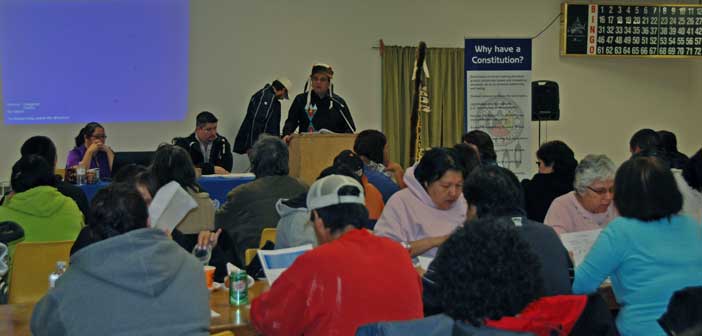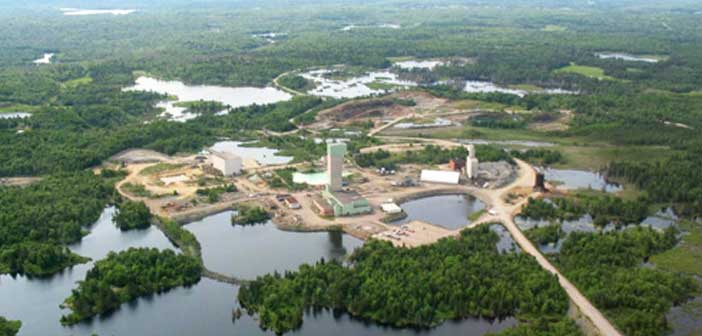WIKWEMIKONG—Last Tuesday evening, members of the Wikwemikong Unceded Indian Reserve gathered at the community centre for a presentation and question and answer event on Chi-Naaknigewin, a community constitution that has been seven years in the making and proposes to “ensure the protection of our rights, both as individuals and as a collective.”
The community hall was filled to capacity with band members of all ages as the evening’s proceedings got underway, led by Lynda Trudeau, governance administrative coordinator with the Wikwemikong Governance Unit. She explained that the chief and council, back in 2007, had decided it was time for the community to have its own constitution, defined as “the fundamental, overarching law of a nation, establishing the institutions of government, defining the scope of power and guaranteeing individual civil rights and liberties.”
After years of conversations, meeting, edits and rewrites, the almost-finished product is ready to be voted on by the community on June 14.
Chief Duke Peltier thanked his community for gathering in what is “truly an historic time in our community, where we’re embarking on a journey to set our ways on a land we call our own.”
He noted the many youths in the audience and the importance of Chi-Naaknigewin, especially for them, and spoke about a recent trip to the Grade 6 classes at Wasse-Abin Pontiac School. “What an intelligent group they are,” he said proudly, confirming that all the work done by council in Chi-Naaknigewin is “to ensure a better life for them—the future leaders of the community.”
“Chi-Naaknigewin helps us to define who we are as Anishinaabe—Anishinaabe that are unceded and Anishinaabe of Wikwemikong,” the chief continued.
[pullquote]“Chi-Naaknigewin helps us to define who we are as Anishinaabe—Anishinaabe that are unceded and Anishinaabe of Wikwemikong,” the chief continued.[/pullquote]
The leader talked of a recent meeting with provincial government officials a few weeks ago that began with them telling the chief that his community enjoys no special rights because it is unceded. “I had to bite my lip and take the democratic approach and continue to listen,” he said. The chief told his community how, when the moment was right, he quietly reached down to his leather bag and pulled out the wampum belts he had brought with him “that define those special rights.”
“The government was taken aback,” he explained. “They didn’t know how to deal with that.”
Chief Peltier said that if there’s one thing government respects, it is the written word which is why a constitution is so important. “It’s time to put this document to the test and enact it into supreme law and begin our own lawmaking procedures that will benefit our community.”
Chief Peltier concluded by commending the work of the governance unit on Chi-Naaknigewin to much applause from the audience.
Ms. Trudeau said that, despite the vigorous attempts at building community awareness of the constitution in Wikwemikong, off-Island and on the web, that there are still plenty of questions out there and encouraged residents to stop by her office or request a home visit. Ms. Trudeau also put out a call for fluent Ojibwe-speaking elders to assist in the process.
Councillor John Dube, who holds the council position on the special portfolio, called June 14 an “historical day for the community. We get to tell our province, our country, how we want to live our lives,” he said. “By voting that day, we’re establishing our jurisdiction.”
Ms. Trudeau went through the time frame of Chi-Naaknigewin, including all of the activities and meetings that have gone into the making of the document.
She spoke of the community’s history and how business was conducted on a nation-to-nation basis. “We need to get the pieces of our past that are good and be reflective of that,” she said. “We know we can’t return 100 percent, but we can take those pieces from the past, mould it and make it reflective of ourselves.”
“The Indian Act isn’t for our people; it’s for the Canadian government,” Ms. Trudeau added. “My name might be Trudeau, but not ‘that Trudeau’,” she laughed along with the audience.
She said she wanted to make the point clear: just because the community may adopt Chi-Naaknigewin as its constitution does not mean it is at the point of self-governance. “We still need to have a relationship with the federal government,” she said. “We don’t want people to think that we’re going on our own and will start taxing ourselves.” The constitution will, however, give the community more power down the road, should they one day choose to break those ties.
Ms. Trudeau explained the lawmaking process as part of Chi-Naaknigewin, giving the example of the Peltier family asking chief and council for a law which states that anyone crossing the border must wear yellow pants. This can’t be done, she said, without a public process and three readings of the proposed law through chief and council. A law will require 50 percent plus one of the council’s votes to pass.
While accountability is already in place now, the document confirms the accountability of chief and council.
Chi-Naaknigewin also enshrines the role of elders in the community’s decision-making with an elders’ council to be set up through appointment by chief and council. A justice council will also be enacted, elected by the community, which will act as the “independent judicial authority of Wikwemikong Unceded Territory.”
Ms. Trudeau explained that the Chi-Naaknigewin will be a fluid object that can be changed or amended as the community changes.
“The Indian Act is designed to assimilate us but the Chi-Naaknigewin is made so we can continue to be Anishinaabe,” she said, emotion in her voice. “So that when my son is a grandfather, he will continue to be Anishinaabe.”
To help get the word out, the community is hosting a video, poster and essay contest on ‘what Chi-Naaknigewin means to me’ and ‘the difference between the Indian Act and Chi-Naaknigewin.’ Posters have been put up, mailouts sent, and webinars hosted among many other avenues of communication in spreading the word.
The floor was then opened up to the community for any questions they had on Chi-Naaknigewin.
One community member said he worried how little his fellow residents knew of the federal government and the low voter turnout during election time. “The majority don’t vote,” he said, “If we all get involved in the vote, and we vote the same, we could have the power.”
Ms. Trudeau noted that only 16 percent of eligible voters cast a ballot for chief and council. “When we band together we are very powerful,” she added.
One woman asked whether the government would recognize the constitution, or if that even mattered.
“It doesn’t matter,” Ms. Trudeau responded. “(The government) makes decisions without our recognition anyway.”
Another person in the audience questioned the appeals process, asking why this process wasn’t already determined. Ms. Trudeau said this would be established in the very near future.
One woman asked about the foundation of Chi-Naaknigewin, “to us as Anishinaabe people.” She said she worried that as soon as the document is written down, it would take precedence over Wikwemikong’s oral traditions “that are paramount to our community.”
Ms. Trudeau referred back to the preamble, which states: “We are Wiikwemkoong Anishinaabek. Our home is Odawa Mnis and surrounding islands. Our lands are Unceded.”
“We have retained these lands for our future generations so that they can continue to be Anishinaabe. We have not relinquished any of our rights to any of the lands in the Great Lakes Basin to any nation,” the preamble continues. “We continue to govern the waters, air, and lands including island, as our ancestors have since time immemorial. The Wikwemikong Gchi-Naaknigewin will ensure the protection of our rights, both as individuals and as a collective.”
“Just because it gets voted on doesn’t mean it gets shelved,” Ms. Trudeau assured. “We’re so busy trying to appease the reporting system of our federal government that we’re forgetting we’re a nation here and this document maintains that.”
Another woman questioned the difference between the Wikwemikong Unceded Indian Reserve and the larger territory. Chief Peltier harkened back to the earlier story of his meeting with provincial officials and how they noted to the chief that the community’s name had ‘Indian Reserve’ in it. “We’ve bought into what has been imposed upon us,” he said, “but ‘Indian Reserve’ has never been part of the name of our community.”
Chief Peltier told the audience that, during his visit with the Grade 6 classes, he asked them what it was they were most proud of. “That I’m an Anishinaabe,” they responded.
“We’re trying to take our own thought processes, our own intellect, and put them in place,” he said, noting that there is very little, if any, reference to Ontario, Canada or the Indian Act in the proposed constitution.
“Our territories include the waters that flow in the Great Lakes,” he said, speaking of the community’s ancestral trade routes and hence the use of the word ‘territories’ in Chi-Naaknigewin.
The vote on Chi-Naaknigewin will take place on Saturday, June 14.





